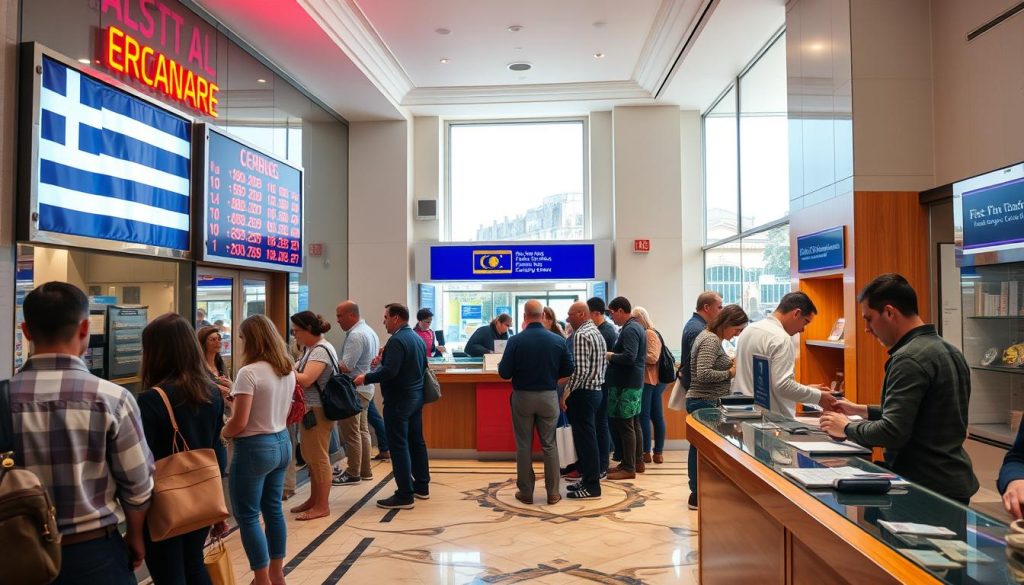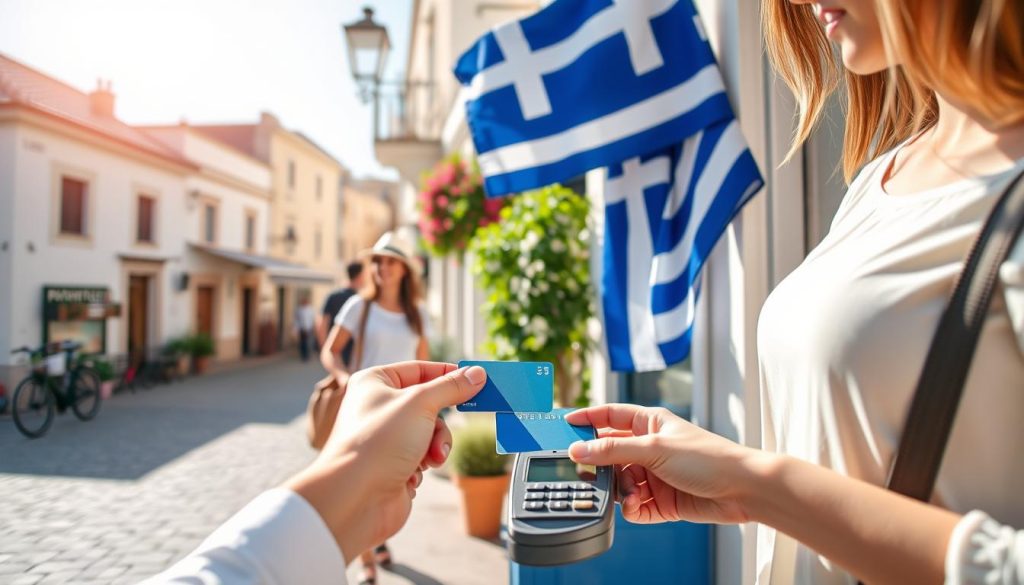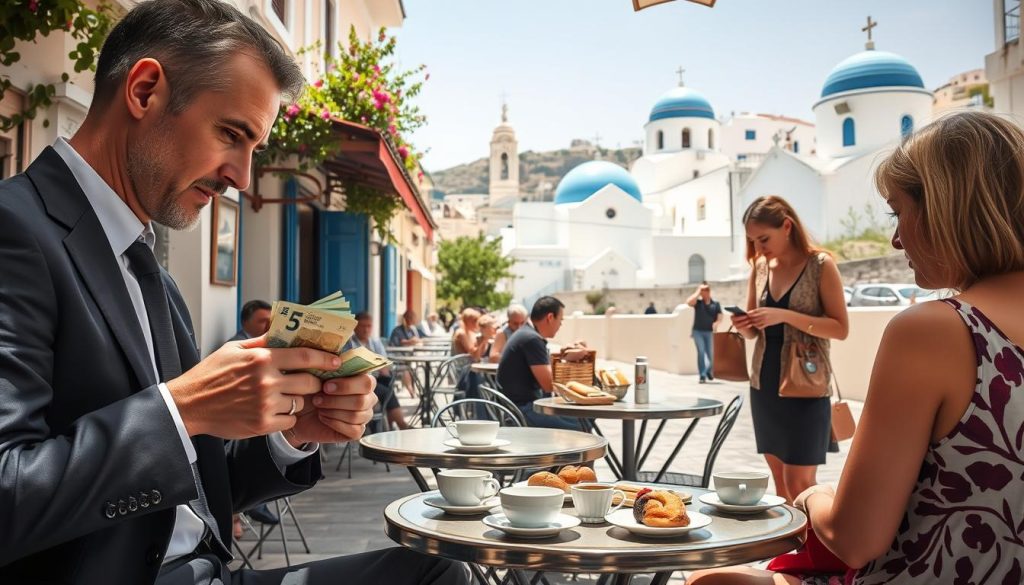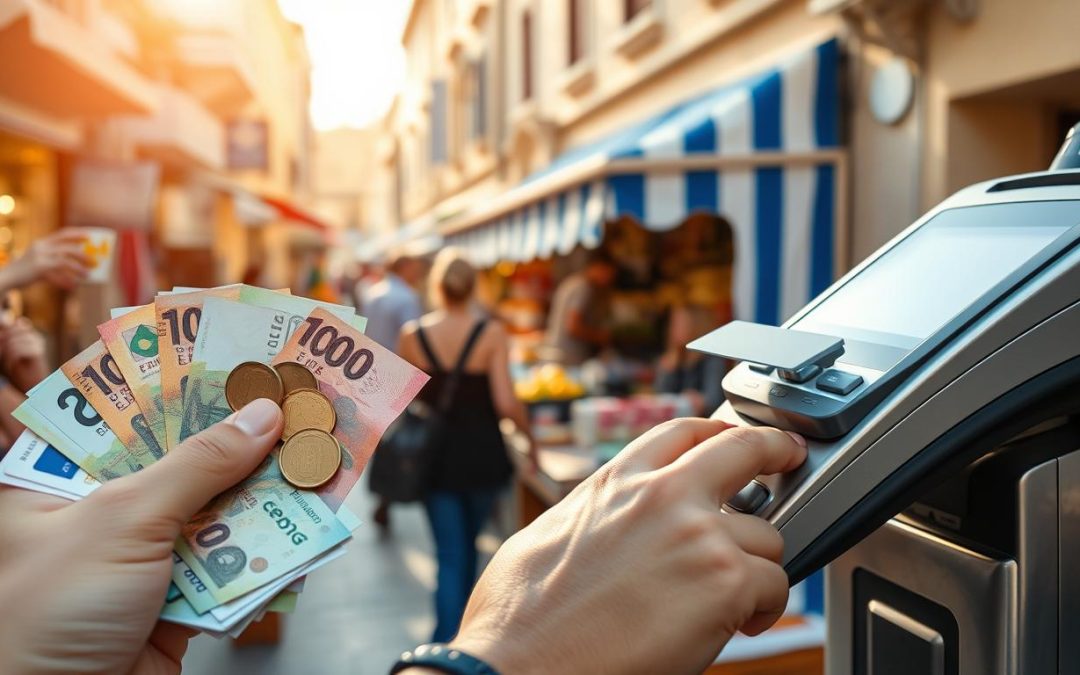Have you ever wondered how to manage your money seamlessly while exploring a new destination? Understanding the local currency and payment options can make your trip smoother and more enjoyable. This guide is here to help you navigate everything you need to know about handling finances during your travels.
Since 2002, the euro has been the official currency, replacing the drachma. Knowing how to use it effectively can save you time and stress. Whether you’re withdrawing cash, using a card, or exchanging money, this guide covers it all.
From practical tips on managing cash to choosing the best bank card, you’ll find everything you need for a hassle-free experience. Let’s dive in and make your travel adventure as smooth as possible!
Key Takeaways
- The euro is the official currency, replacing the drachma in 2002.
- Carry a mix of cash and cards for convenience.
- Mastercard and Visa are widely accepted, while American Express has limited use.
- ATMs are common but may charge fees for withdrawals.
- Exchange rates can vary, so compare options before converting money.
Introduction to Greece’s Money Landscape
Managing your finances abroad can be tricky, but it doesn’t have to be stressful. Knowing how to handle money in a new country ensures a smooth and enjoyable trip. In this section, we’ll explore the basics of currency and payment options to help you make the most of your adventure.
Why Currency Matters for Your Trip
Understanding the local currency is key to budgeting effectively. Without this knowledge, you might end up paying extra fees or getting poor exchange rates. For example, exchanging cash at airports or tourist spots often comes with higher costs. By planning ahead, you can save both time and money.
Carrying a mix of cash and cards is a smart move. While cards are convenient for larger purchases, cash is essential for small shops and rural areas. This balance ensures you’re prepared for any situation.
An Overview of Payment Options in Greece
Greece offers a variety of payment methods to suit your needs. Credit and debit cards are widely accepted in cities, but cash is often preferred in smaller towns. Prepaid travel cards are another great option, allowing you to lock in favorable exchange rates before your trip.
ATMs are common in major cities, but be aware of potential fees. Always choose to be charged in the local currency to avoid extra costs. With these tips, you’ll navigate Greece’s money landscape like a pro.
Greece: Ultimate Travelers Guide to Currencies & Payments
Planning your finances for a trip can make all the difference in your experience. This guide is designed to help you navigate the local money landscape with ease. Whether you’re withdrawing cash, using a card, or exchanging currency, understanding your options is key.

Since the adoption of the euro in 2002, managing your currency exchange has become simpler. However, knowing how to use it effectively can save you time and avoid unnecessary fees. Carrying a mix of cash and cards ensures you’re prepared for any situation, from bustling cities to remote villages.
ATMs are widely available in urban areas, but rural spots may have limited access. Always choose to be charged in euros to avoid extra costs. Cards like Visa and Mastercard are widely accepted, but having some cash on hand is essential for smaller transactions.
This guide will walk you through everything you need to know about handling your finances. From practical tips to avoiding hidden fees, you’ll be ready to make the most of your travel adventure. Keep reading to discover actionable advice for a seamless experience.
The Euro: Greece’s Official Currency
Exploring a new country becomes easier when you understand its currency. Since 2002, the euro has been the official currency, replacing the drachma. This transition simplified transactions and made travel within the eurozone more convenient.
From Drachma to Euro: A Historical Transition
The shift from the drachma to the euro marked a significant change. The fixed exchange rate was set at 1 euro = 340.75 drachmas. This move streamlined financial systems and made everyday transactions easier for locals and visitors alike.
In cities like Athens, the adoption of the euro brought uniformity to payments. It also reduced the need for constant currency exchange, saving time and money for travelers.
Understanding Euro Banknotes and Coins
Euro banknotes come in seven denominations: €5, €10, €20, €50, €100, €200, and €500. Each note features distinct colors and architectural styles, making them easy to identify.
Coins, on the other hand, have a common European design on one side and country-specific motifs on the other. Greek coins often depict historical figures and symbols, adding a unique touch.
| Denomination | Type | Design |
|---|---|---|
| €5 | Banknote | Gray, Classical architecture |
| €10 | Banknote | Red, Romanesque architecture |
| €1 | Coin | Owl, symbol of Athena |
| €2 | Coin | Europa, Greek mythology |
Familiarizing yourself with these designs can help you avoid counterfeit bills and understand currency denominations. Whether you’re in a bustling city or a quiet village, knowing the euro ensures smoother financial transactions during your trip.
Using Bank Cards and the Wise Travel Card in Greece
Handling your finances while traveling doesn’t have to be complicated. With the right tools and knowledge, you can make payments smoothly and avoid unnecessary fees. In this section, we’ll explore how to use bank cards and the Wise Travel Card effectively during your trip.

Where and When to Rely on Cards
Bank cards are widely accepted in urban areas, especially in hotels, restaurants, and larger stores. They offer convenience and security for larger transactions. However, it’s always a good idea to carry some cash for smaller vendors or rural areas where card acceptance may be limited.
Major credit cards like Visa and Mastercard are commonly used, while American Express is less accepted. Before your trip, inform your bank about your travel plans to avoid any issues with card usage abroad.
Avoiding Extra Fees and Dynamic Currency Conversion
One common pitfall is dynamic currency conversion, where merchants offer to charge you in your home currency. This often results in poor exchange rates and additional fees. Always opt to pay in euros to avoid these extra costs.
The Wise Travel Card is an excellent alternative for managing your money. It offers low fees and competitive exchange rates. You can top up the card via the Wise app and use it for payments and withdrawals in euros, saving you from unnecessary charges.
| Card Type | Acceptance | Fees |
|---|---|---|
| Visa | Widely Accepted | Foreign Transaction Fee: 1-3% |
| Mastercard | Widely Accepted | Foreign Transaction Fee: 1-3% |
| American Express | Limited | Higher Fees |
| Wise Travel Card | Widely Accepted | Low Fees, No Foreign Transaction Charges |
By understanding these tips and using the right card, you can manage your finances efficiently and enjoy a hassle-free trip. Always check your card’s policies and consider using the Wise Travel Card for added convenience and savings.
Navigating ATM Use and Currency Exchange Options
Accessing cash and exchanging money efficiently can make your travels stress-free. Whether you’re in a bustling city or a quiet village, knowing where to find ATMs and how to get the best exchange rates is essential. This section will guide you through the process, ensuring you’re prepared for any situation.
Finding ATMs Across Cities and Rural Areas
ATMs are widely available in urban centers like Athens, but they can be harder to find in rural areas. Major banks operate most machines, and they accept popular cards like Visa and Mastercard. However, smaller towns or islands may have limited access, so it’s wise to plan ahead.
To avoid frequent fees, withdraw larger amounts less often. Most ATMs have a daily limit of €600, so check your bank’s policies before traveling. Always cover your PIN and be aware of transaction fees, which can range from €1.5 to €4 per withdrawal.
Best Practices for Exchanging Currency
When exchanging money, choose local banks or reputable outlets over airport kiosks. These places often offer better exchange rates and lower fees. Before making a transaction, check the current rate online using trusted resources to ensure you’re getting a fair deal.
Carry a mix of cash and cards for flexibility. While cards are convenient in cities, cash is essential for smaller vendors and rural areas. Planning your cash needs ahead of time can save you from unexpected shortages, especially in remote locations.
- Withdraw larger amounts less frequently to minimize fees.
- Use local banks or reputable exchange outlets for better rates.
- Check the current exchange rate online before making transactions.
- Plan your cash needs, especially in areas with limited ATM access.
Tips for Managing Your Money and Budgeting in Greece
Keeping track of your spending while traveling can make your trip more enjoyable and stress-free. By planning ahead and understanding average costs, you can avoid overspending and focus on the experience. Here’s how to manage your money effectively during your journey.

Accommodation is one of the biggest expenses. Budget-friendly options like hostels start at around €15 per night, while mid-range hotels average €100. Luxury stays can go up to €250. Plan your lodging based on your budget and preferences.
Meals can also add up quickly. Street food is an affordable choice at €3.50 per dish, while mid-range restaurants cost €20-€35 per meal. Groceries are a great way to save, averaging €8.50 per day for a week’s worth of food.
When it comes to attractions, entry fees vary. The Acropolis starts at €50, while smaller sites like the Museum of Olive Oil cost just €4. Prioritize the experiences that matter most to you to stay within budget.
Using a mix of cash and card is key. Cards are convenient for larger purchases, but cash is essential for small vendors and rural areas. Always carry some euros to avoid being caught without options.
To avoid unexpected fees, choose local currency exchange outlets over airport kiosks. Withdraw larger amounts less frequently to minimize ATM fees. Apps like Wise or budgeting tools can help you track expenses in real time.
Finally, don’t forget to tip appropriately. In restaurants, rounding up the bill or leaving 5-10% is customary. For taxi drivers, a small tip is appreciated but not mandatory. These small gestures can enhance your travel experience.
“A well-planned budget is the key to a stress-free trip.”
By following these tips, you can make the most of your travel adventure without breaking the bank. Keep a daily spending log, use budgeting apps, and stay mindful of your expenses to ensure a smooth and enjoyable journey.
Exchanging Currency: Banks, Bureaus, and Alternatives
Exchanging currency efficiently can save you money and time during your travels. Knowing where to go and how to avoid hidden fees ensures you get the most value for your money. Let’s explore the best options for currency exchange and how to make the process hassle-free.
Comparing Rates for the Best Deal
When exchanging money, local banks often offer better exchange rates than airport kiosks or tourist spots. For example, banks typically add a markup of 2-5% to the mid-market rate, while airport kiosks may charge even higher fees. Always check the current rate online before making a transaction to ensure you’re getting a fair deal.
Exchange bureaus are another option, but rates can vary widely. Look for reputable outlets like Kapachange or Eurochange, which operate multiple branches in major cities. Online platforms like Wise also provide competitive rates with low fees, making them a convenient choice for travelers.
To avoid unnecessary costs, steer clear of currency conversion services at hotels or tourist areas. These locations often charge high commissions and offer unfavorable rates. Instead, plan ahead and use trusted banks or online tools for your exchange needs.
“Always compare rates and avoid last-minute exchanges at airports or hotels.”
Here are some practical tips to keep in mind:
- Use online currency exchange platforms for real-time rates and low fees.
- Withdraw larger amounts less frequently to minimize ATM fees.
- Carry a mix of cash and cards for flexibility in different situations.
By following these guidelines, you can make the most of your travel budget and enjoy a stress-free experience. Whether you’re in a bustling city or a quiet village, knowing how to handle currency exchange ensures you’re always prepared.
Using Cash Wisely: Small Transactions and Tipping Etiquette
Making the most of your cash during your trip ensures smooth transactions and avoids unnecessary stress. While cards are convenient, having cash on hand is essential for small shops, street vendors, and services where tipping is customary. Here’s how to use cash effectively and navigate local tipping etiquette.

Essential Cash Tips for Everyday Spending
Carrying smaller bills or coins makes transactions quicker and easier. Many small vendors and rural areas prefer cash, so it’s wise to keep a reserve. For example, street food or local markets often don’t accept cards, making cash a necessity.
Balance your cash and card usage to avoid issues in areas where cards aren’t widely accepted. Withdraw larger amounts less frequently to minimize ATM fees. This approach ensures you’re prepared for any situation without overspending on small expenses.
Tipping Etiquette in Greece
Tipping is a common practice, but the amounts vary by service. In restaurants, rounding up the bill or leaving 5-10% is customary. For taxi drivers, a small tip is appreciated but not mandatory. Here’s a quick guide to help you navigate tipping:
| Service | Tipping Percentage |
|---|---|
| Restaurants | 5-10% |
| Cafes | Round up or €1-€2 |
| Taxis | Round up or €1-€2 |
| Hotel Staff | €1-€2 per service |
By following these tips, you can manage your cash wisely and show appreciation for excellent service. Whether you’re dining at a restaurant or exploring local shops, these practices ensure a seamless and enjoyable experience.
Understanding and Avoiding Common Payment Pitfalls
Navigating payment systems abroad can save you from unexpected costs and stress. While managing your money in a new country, it’s easy to overlook hidden fees or fall into traps like dynamic currency conversion. This section will help you identify and avoid these common pitfalls, ensuring a smoother financial experience.
Handling Hidden Fees and Surcharges
Hidden fees can quickly add up, especially when using credit cards or debit cards abroad. Many banks charge foreign transaction fees, typically ranging from 1% to 3%. Always check with your bank before traveling to understand these costs.
Another common issue is dynamic currency conversion, where merchants offer to charge you in your home currency. This often results in poor exchange rates and additional fees. Always opt to pay in the local currency to avoid these extra charges.
Here are some tips to minimize fees:
- Use cards with no foreign transaction fees, like the Wise Travel Card.
- Withdraw larger amounts less frequently to reduce ATM fees.
- Verify all charges on your bank statements to catch unauthorized fees.
Safety Tips for Using Credit and Debit Cards
Keeping your card details secure is crucial when traveling. Always use secure ATMs located inside banks or well-lit areas. Avoid using public Wi-Fi for banking transactions, as it increases the risk of fraud.
Monitor your accounts regularly for unauthorized transactions. If you notice anything suspicious, contact your bank immediately. Many banks offer travel alerts, which can help detect fraud early.
Carry a backup card in case your primary one is lost or stolen. This ensures you’re never left without access to your money. By following these safety tips, you can protect your finances and enjoy a worry-free trip.
Practical Insights for Mobile Banking and Online Payments
Digital tools are transforming the way you handle money while traveling. Mobile banking and online payment systems have made transactions faster and more secure. With just a few taps on your phone, you can manage your finances efficiently, even when you’re far from home.
Dedicated apps offer real-time updates on exchange rates and account balances. This helps you stay informed about your spending and avoid surprises. Apps like Wise or Revolut also provide low fees and competitive rates, making them a smart choice for international transactions.
When selecting an online payment method, prioritize security and reliability. Look for platforms that comply with the Payment Card Industry Data Security Standard (PCI DSS). This ensures your personal information is protected during every transaction.
Using home banking services can also simplify your financial management. Many banks offer mobile apps that allow you to oversee international transactions and monitor your accounts. This way, you can keep track of your spending without any hassle.
Digital payments complement traditional options like cash and cards. While cards are convenient for larger purchases, mobile payments are ideal for quick, small purchases. This balance ensures you’re prepared for any situation during your travel.
“Mobile banking apps are a game-changer for travelers, offering convenience and security at your fingertips.”
Here are some tips to make the most of digital payments:
- Use apps with low fees and real-time exchange rate updates.
- Enable notifications to monitor account activity and detect unauthorized transactions.
- Carry a backup card in case your primary payment method fails.
By integrating digital tools into your financial strategy, you can enjoy a seamless and stress-free experience. Whether you’re making a purchase or checking your balance, these insights will help you stay in control of your money.
Conclusion
Making your trip smooth starts with smart money management. The euro is central to a hassle-free experience in this beautiful destination. Use a mix of cash and cards to stay prepared for any situation, whether in bustling cities or quiet villages.
Plan ahead to avoid hidden fees. Compare exchange rates and choose reputable banks or platforms like Wise for better deals. Always opt to pay in the local currency to save on unnecessary charges.
With these tips, you can enjoy every moment of your travel adventure. Proper planning ensures your financial transactions are secure and efficient, letting you focus on the beauty of this country.
The above is subject to change.
Check back often to TRAVEL.COM for the latest travel tips and deals.
Here are some Tours & Sightseeing suggestions that might pique your interests!
